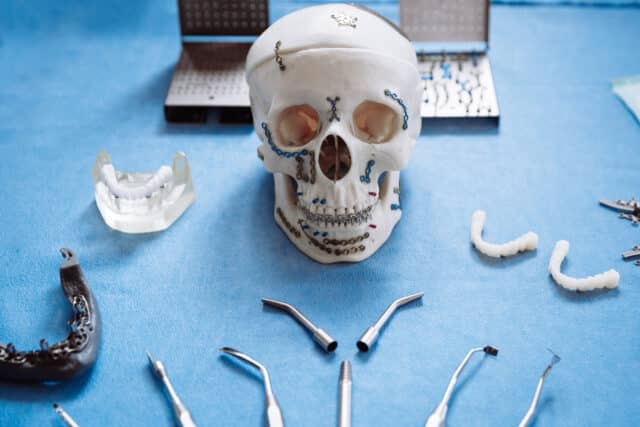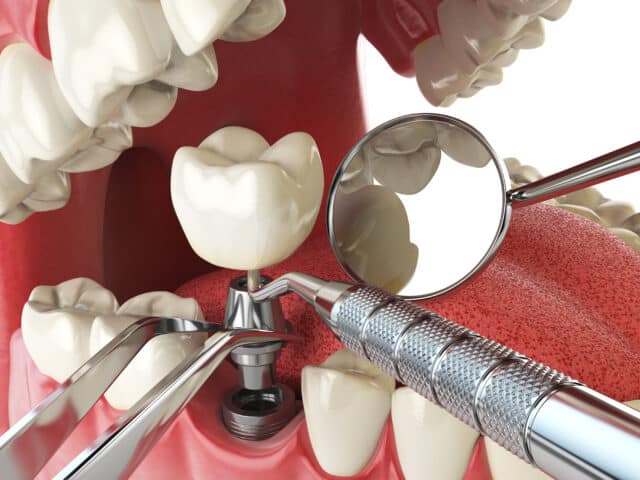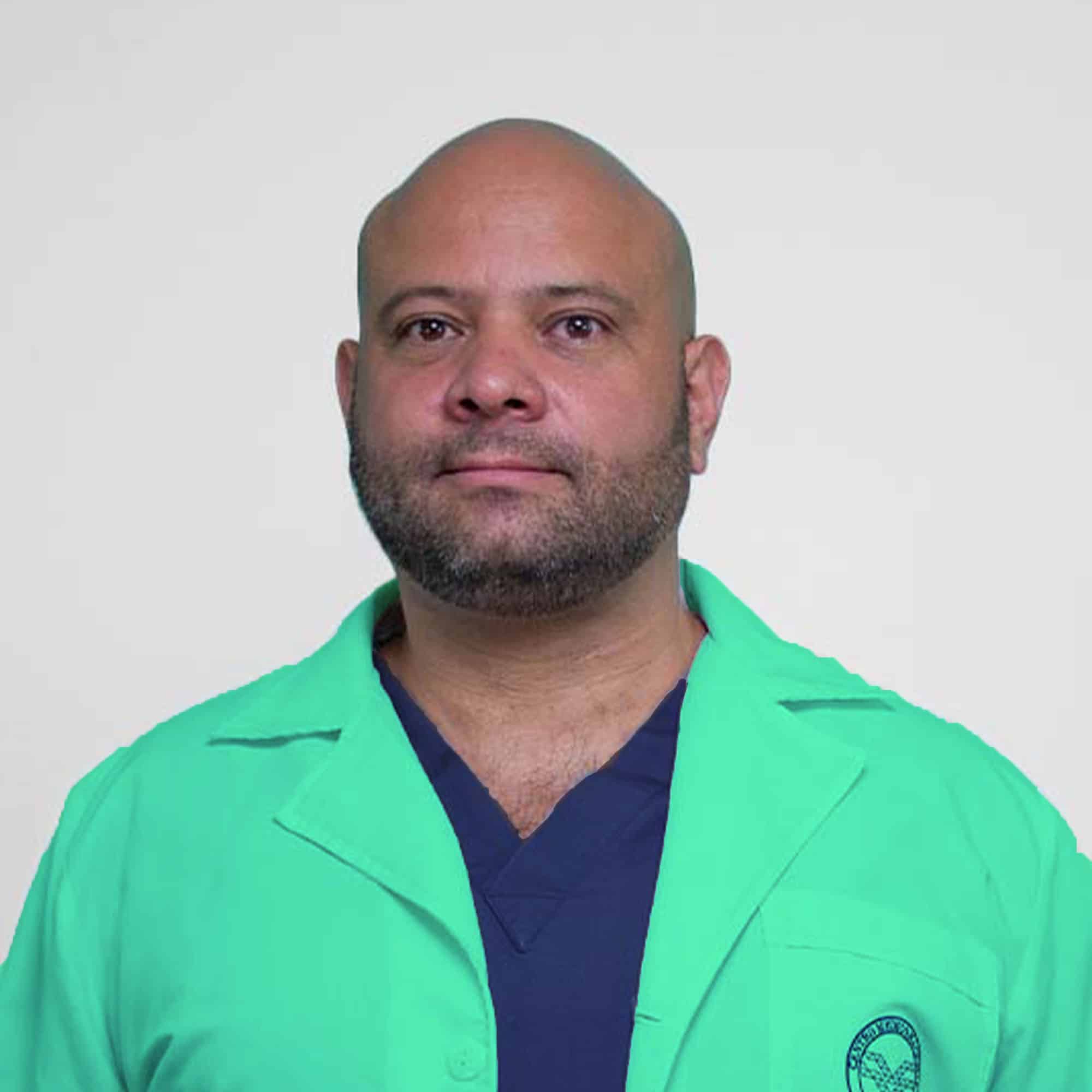Maxillofacial surgery: what operations does it include?
Maxillofacial surgery encompasses different interventions aimed at correcting problems related to the facial structure.
There is some confusion as to which interventions it refers to and who is the professional in charge of carrying them out.
Maxillofacial surgery acts mainly in the mouth area, a part of our body that we usually associate with the work of a dentist.
However, this type of operation is not performed by a general dentist, but by a maxillofacial surgeon.
To solve all your doubts, in this article we explain exactly what maxillofacial surgery is and what is its area of action.
What is maxillofacial surgery?
Maxillofacial surgery is a medical specialty that deals with the diagnosis and surgical treatment of any problem related to the facial structure.
That is, it acts on the mouth, teeth, jaw bones, face, head and neck.
A maxillofacial surgery deals with a wide range of problems, since it deals with diseases, injuries and defects or anomalies in development.

Who is the professional who performs maxillofacial surgery?
Surgical interventions carried out to correct problems related to the facial structure are performed by maxillofacial surgeons.
At this point, it is convenient to explain that maxillofacial surgeons are doctors who have completed the specialty of Oral and Maxillofacial Surgery.
Now that we have gone over what a maxillofacial surgeon is, let us focus on the differences between a maxillofacial surgeon and a dentist or odontologist.
Maxillofacial surgery encompasses treatments aimed at restoring the harmony and functionality of the facial structure.
What interventions does maxillofacial surgery perform?
Maxillofacial surgery encompasses a wide variety of procedures.
Below, we will detail which are the most commonly performed interventions:
Extraction of wisdom teeth
Exodontia is one of the most frequent dental treatments that can be performed in a dentist’s office.
Also known as wisdom teeth, wisdom teeth extraction is always performed under the effects of local anesthesia.
In this case, the procedure can be performed by a dentist, as long as it is not excessively complex.
However, if it is necessary to remove all four molars, the patient may require general anesthesia.
In this case, it will be essential to resort to a hospital environment and put a maxillofacial surgeon in charge.
Placement of dental implants
As in the previous case, dental implant surgeries can be performed by both the maxillofacial surgeon and specialized dentist (Implantologist).
However, it is important that, although it is a dentist who performs the insertion of the implant, it must be a specialist in Implantology.
The implantologists at DrAW Dental Clinic practice their specialty exclusively, so they have extensive experience in this type of dental surgery.
Even so, as with the extraction of wisdom teeth, the choice of one or the other professional depends on the characteristics of the intervention.
If general anesthesia is to be used, it will be necessary to perform the surgery in a hospital and under the supervision of an oral surgeon.

Tumor removal
When it comes to oral cancer, the role of the dentist can be decisive when it comes to early detection.
In many cases, it is the dentist who detects the first signs of the development of an oral tumor, usually during routine check-ups.
If a tumor is suspected, the dentist refers the patient to the hospital so that the area suspected of being affected can undergo a biopsy.
If the tumor is diagnosed, the maxillofacial surgeon is responsible for surgical intervention in the area.
He or she must also reconstruct the tissues lost after the tumor has been removed.
Orthognathic maxillofacial surgery
Orthognathic surgery aims to correct discrepancies between the upper and lower jaw (mandible).
These anomalies can be due to either excess or lack of growth of the maxillary bones.
Due to the imbalance of sizes or positions between the bony structures, numerous malocclusions appear that affect the functionality and esthetics of the mouth.
If the difference is very pronounced, the disproportion between the maxillary bones can cause many inconveniences in daily life when chewing food, for example.
In addition, the aesthetic appearance of the face can be seriously compromised.
This type of intervention should always be performed by a maxillofacial surgeon, although an orthodontic specialist should also work together with him.
Orthognathic surgery involves orthodontic treatment, both before and after the operation.
In this way, not only the position of the bones is corrected, but also the position of the teeth.
As it is a more complex intervention than the previous ones mentioned, the patient’s recovery time can be up to 1 month.

Reconstructions of the jaw
Maxillofacial surgery can also be used when it is necessary to reconstruct an area of the jaw.
This need may be caused by malformations or serious accidents.
Differences between a dentist and a maxillofacial surgeon
As we have been clarifying, a dentist is not always the right professional to perform certain treatments included within the specialty of maxillofacial surgery.
And the fact is that they are really different specialists, not only because of the work they perform, but also because of the degree each one has completed.
On the one hand, a maxillofacial surgeon has a degree in Odontology and, subsequently, has medical specialization in Maxillofacial Surgery through his or her hospital residency.
The dentist, on the other hand, is a person with a degree in Dentistry.
We are, therefore, faced with two completely independent and distinct degrees.
Despite this, both the specializad dentist and the surgeon share two treatments, depending on their complexity:
- Placement of dental implants
- Extraction of wisdom teeth
Consultation with the doctor
Maxillofacial surgery is contraindicated in the case of pregnant women and people suffering from heart disease.
Do the maxillofacial surgeon and the dentist perform different jobs?
Once we have established the fundamental difference between both professionals, let us distinguish what type of work each of them performs.
Generally speaking, we can say that the maxillofacial surgeon is qualified to perform more complex surgical interventions that involve, to a greater extent, the structure of the face.
The dentist, on the other hand, performs surgeries that, in principle, present a lower level of complexity.
In addition, the dentist is the professional in charge of treating any pathology related to teeth, gum disease and the improvement of dental position.
Can maxillofacial surgery be applied to anyone?
Generally speaking, we can say that maxillofacial surgery can be performed on both adults and children.
However, since it includes different types of interventions, it is necessary to emphasize that each of these surgeries may have different contraindications.
It is usually not recommended for pregnant women or patients with heart problems, especially because of the anesthetic substances to be applied.
In any case, the best way to find out if you are a suitable person to undergo this type of intervention is to consult your specialized dentist or an oral surgeon.
Once they have examined you and performed different dental tests, they will be able to tell you the suitability of one or another intervention or treatment.
If you need further information on the details we have given you in this article, we encourage you to contact us.
You can do so through this contact page.
Payment facilities in DrAW Dental
At DrAW Dental Clinic we offer our patients very flexible and attractive payment conditions:
- Financing of 100% of the treatment ask how
- Discounts for early payment
If you have further questions or wish to receive a diagnosis about your case, we advise you to contact our clinic.
Once you have made an appointment, Dr. Wintergerst will be able to answer all your questions and explain the planning of your treatment.
Remember that it is not only a question of aesthetics, but of health, and that undergoing this surgery can change your life completely.
If you need our doctors to assess the state of your oral health, don’t let it pass you by and make an appointment.
Call us at +1 619 372 5409 🇺🇸 +52 664 590 8321 🇲🇽 , or use the contact form on our website, and ask for your first free appointment.
We will give you a complete diagnosis and an estimate without obligation.
You will be interested in » Orthognathic Surgery: What is the postoperative period like and when will I be able to lead a normal life?
Read Our Orthognathic Surgery Guide
At DrAW Dental Clinic we are guided by editorial guidelines that ensure the accuracy of all the information we publish. If you would like to know more about how we ensure that our content is up-to-date and properly supported, we encourage you to read our editorial commitment.
Did you find this a 5 star article?
Leave us your rating:
- About the Author
- Latest Posts
The distinguished Dr. Alberto Wintergerst Fisch is an specialist in Maxillofacial Surgery and has more than 15 years of experience in various prestigious institutions such as DrAW Clinic and Dental Glaf.
He trained as a Dental Surgeon at the National Autonomous University of Mexico, later he completed a specialty in Oral and Maxillofacial Surgery at the same institution and a Master’s Degree in Health Organization Administration at La Salle University.
He is attached to the National Medical Center “20 de Noviembre” of the ISSSTE and certified by the Mexican Board of Oral and Maxillofacial Surgery.
Thanks to this, Dr. Wintergerst Fisch is recognized as one of the best specialists in Oral and Maxillofacial Surgery in Mexico City and the country.
Related Posts


